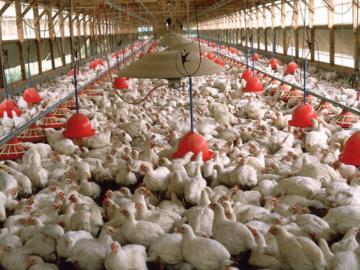
Section Branding
Header Content
Here's How Georgia's Poultry Industry Is Preparing For Bird Flu
Primary Content

More than 200 cases of avian influenza, or bird flu, have been reported in the U.S. There are none yet in Georgia, but that hasn't stopped the state's poultry industry from preparing. That's because chicken is big business here. We're the number one state for broiler chickens and tenth for egg production.
The heart of Georgia chicken country is Gainesville. This is where most of the state's poultry farmers and processors are based. It's also home to the Georgia Poultry Lab network, where Dr. Louise Dufor Zavala is director. She says samples from every commercial chicken raised in Georgia are tested at this facility and others like it in Tifton and Athens. They're ground zero for the state's response to a potential outbreak of avian flu.
"For influenza, for example, every flock is tested before they go to market, the broilers. And the long-lived flocks, the breeders and the layers, are tested at intervals throughout their life," she says.
If a bird tests positive, the sample would be sent to a lab in Iowa for confirmation. Another positive test means hundreds of birds on the affected farm would be euthanized. And the work begins to make sure the virus hasn't spread.
"There are two and six mile zones that are drawn around that index case, or that case of avian influenza," Dr. Zavala says. "And all the farms within that zone are tested every seven days for at least a month to see if the virus had the chance to move to other premises."
This response is part of the state's avian flu plan. You may not have known, but it's been in place for the past decade. And it may get its first real test this year. That's because avian flu is spread by migrating birds. If the virus shows up in Georgia, many believe it's likely to be some time this fall, as flocks fly south.
State Veterinarian Robert Cobb says response teams rehearse the plan several times each year.
"And we would be able to practice and utilize our depopulation techniques and our ability to organize our different component parts that are necessary for that."
Depopulation of birds is key to keep the disease from spreading.
While there have been NO cases reported in Georgia, three flocks were slaughtered in June because they came from an Iowa farm where avian flu was detected.
Many poultry farms have already implemented strict biosecurity measures, like forbidding visitors.
Now, the waiting begins.
Federal agriculture officials are ready to help states control bird flu.
"We're identifying staffing needs and hiring more than 450 additional temporary employees, including 210 animal health technicians and 90 veterinary medical officers. We're also developing a potential vaccine strategy. Should we decide to use vaccines to address the outbreak, we'll have the systems in place to do so," Dr. John Clifford of the USDA's inspection service told a Senate committee earlier this month.
That vaccine is being developed at a federal lab in Athens. Officials there say they're in a test phase, and there's more work to be done before it's a viable option for fighting avian flu.
Tags: avian flu, Georgia Poultry Lab Network
